Posts by bcomito
Compassion: Moving into Suffering
Destruction. And hopelessness. Those were the two realities Deb Russell faced everywhere she looked when she deployed to Turkey with Crisis Response International in March.
On February 6, 2023, an earthquake of magnitude 7.8 hit southeast Turkey near the Syrian border. After the initial earthquake, aftershocks numbering in the thousands continued to rock the region.
When Deb arrived in March, she found endless piles of rubble. “Just dust really.”
Formerly beautiful marble homes and structures hit by earthquakes from two different directions had crumbled, trapping thousands of people inside. The piles of rubble became burial grounds for innumerable decaying bodies, irretrievable by search-and-rescue teams.
The government had sprayed the piles to prevent the spread of disease and to keep down the smell. An impossible task really, and Deb, along with many of her team, came down with some type of eye or respiratory infection when they returned home.
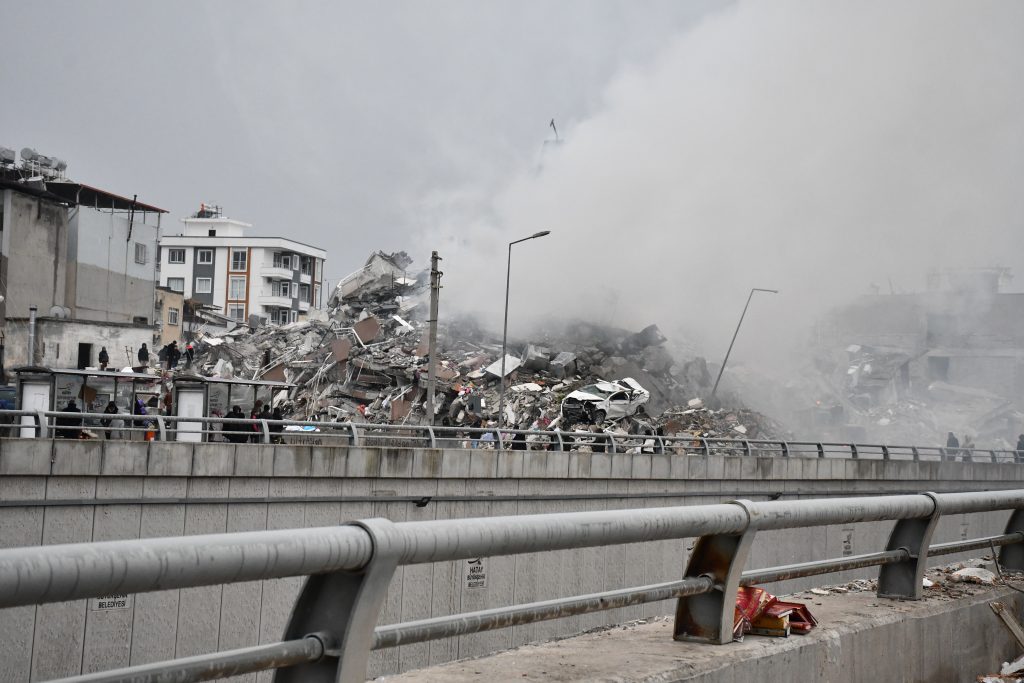
Deb Russell, a trained EMT, is used to moving into uncomfortable places. Her international work started, amazingly, with 9/11. “That was my impetus to go. I wanted to be part of the solution. I have the skills. I’m trained for it, and I want to help people when they’re in crisis.”
Prior to the earthquakes in Turkey, she also went to Greece during the Syrian refugee crisis of 2011. She stood on the shore, helping people from boats, administering emergency aid to the elderly, to pregnant mothers, to children. Holding and hugging, she prayed the Holy Spirit would transfer from her heart to theirs.
“It was like the end-times church. Christians coming from all over the world to extend hope and prayer and the love of Jesus… To proselytize is against the law, so you sing in whispers. I love being in the Body of Christ; unapologetic, unbound, candle-burning at both ends and dispelling darkness with love.
“The Turkish people had lost all hope,” Deb said. Many of them had never known poverty before, but quite suddenly, they were left without anything. “They didn’t even have rope to tie their tattered tarps.” Many of them believed their god was angry with them because of the corruption in the country and government. They would hug us and thank us, asking again and again, Why have you come? How is it the Christian Americans are here to help us and our own government has yet to bring assistance? They just couldn’t believe it. They felt deserted by everyone.
“Jesus brought me,” Deb replied, “and that’s how I found you.”
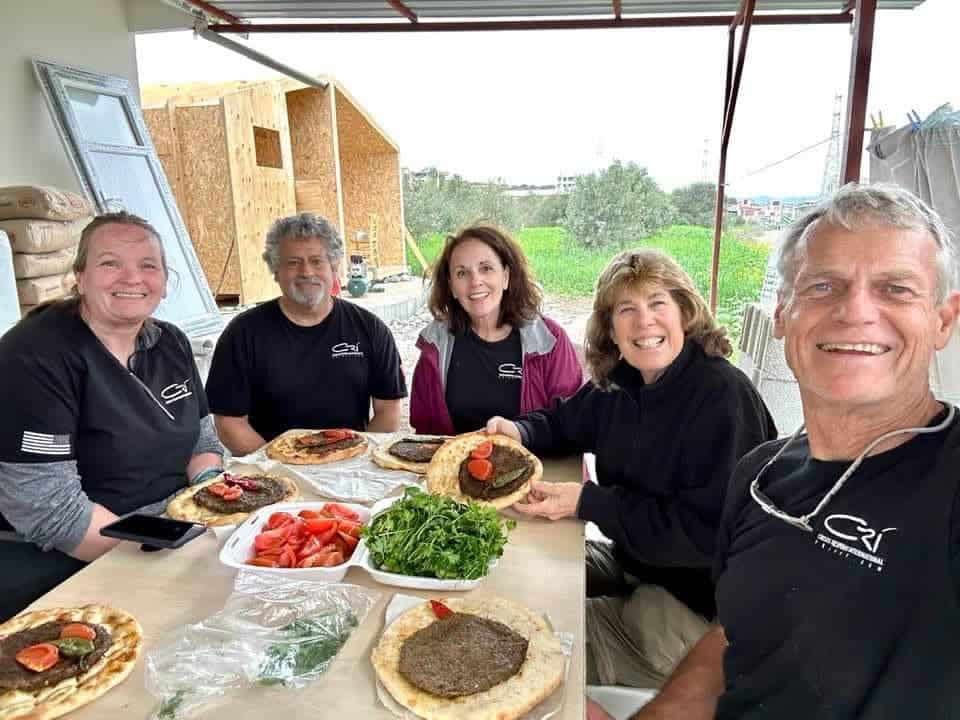
Deb and her team worked to build homes and temporary structures. They hauled and lifted and hammered – hard physical labor – but they also sat among the ruins and listened over tea or coffee.
“On every deployment, my heart is full yet shattered at the same time.” Shattered because of the suffering all around. “Everybody is vulnerable. Everybody is desperate. Sadness, depression and suicide fill the atmosphere. Yet, I also find myself full-hearted because it is obvious God is transforming and empowering lives as we extend our hearts to help. This is the expectation God has for us.”
What Is Compassion?
Compassion comes from the Latin “com” (with or together) and “passion” (suffer). To suffer with. (Merriam Webster) “Compassion and empathy both refer to a caring response to someone else’s distress. While empathy refers to an active sharing in the emotional experience of the other person, compassion adds to that emotional experience a desire to alleviate the person’s distress.”
Scripture tells us to be compassionate.
“Be kind and compassionate to one another, forgiving each other, just as in Christ God forgave you.” — Ephesians 4:32
“Be like-minded, be sympathetic, love one another, be compassionate and humble.” 1 Peter 3:8
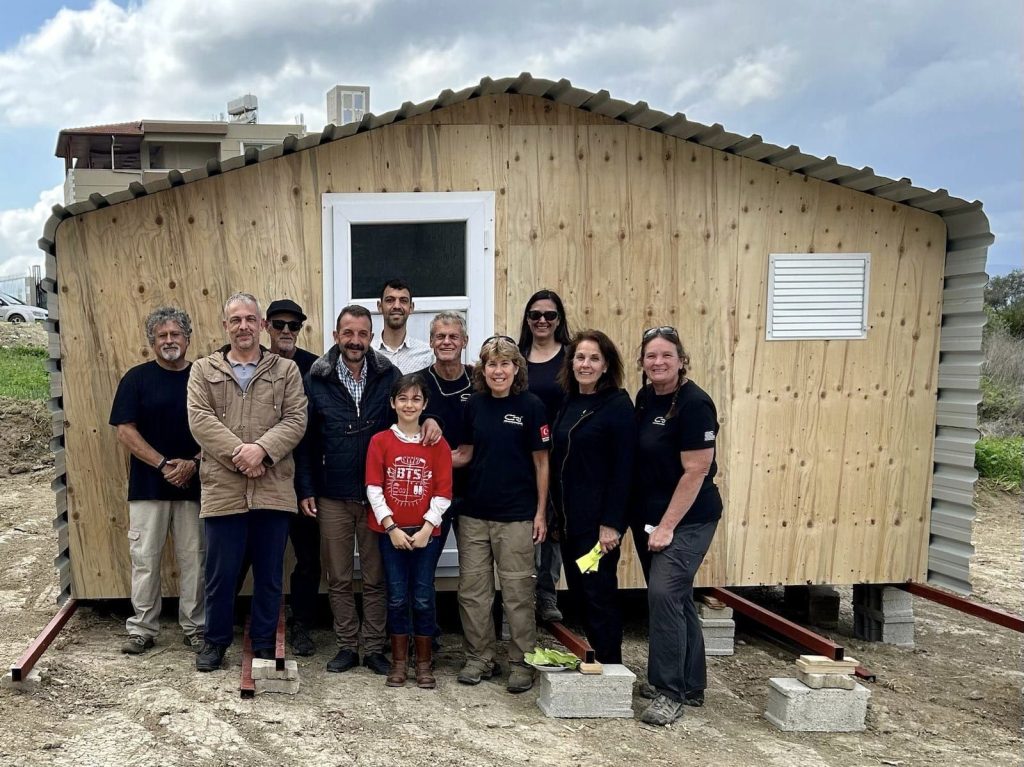
The Joy of the Lord
For two to three weeks at a time, Deb lived with what she could carry on her back – clothes, sleeping bag, toilet paper, Bible. And to prepare herself, she prayed. And prayed.
“Our western culture is so removed from tragedy. We can’t begin to relate to why a mother would want to put her child in a boat. They call the Aegean Sea ‘Death’s Grip.’ So many don’t make it.
“We don’t want to suffer – even vicariously – but God keeps putting stuff in front of me. He wants me there. He opens doors. He makes it amazing. When he says, ‘Jump,’ I jump. When he says, ‘Duck,’ I duck. I’m walking with God. I’m in rhythm with him.
“I have to experience God like this. It enriches my soul, my life.”
And, in the process, Deb says, she finds commonality with “the others.”
“People are harder to dislike, avoid or disregard when you find common ground. They, too, love their children; they want them to be safe. They are discouraged and desperate for help. No different than you or I. If I were in dire circumstances as they are, I most certainly would want someone to extend heart and hand.
“Caring for others opens up things in your own life. I move into suffering because I know I will find Jesus there.”
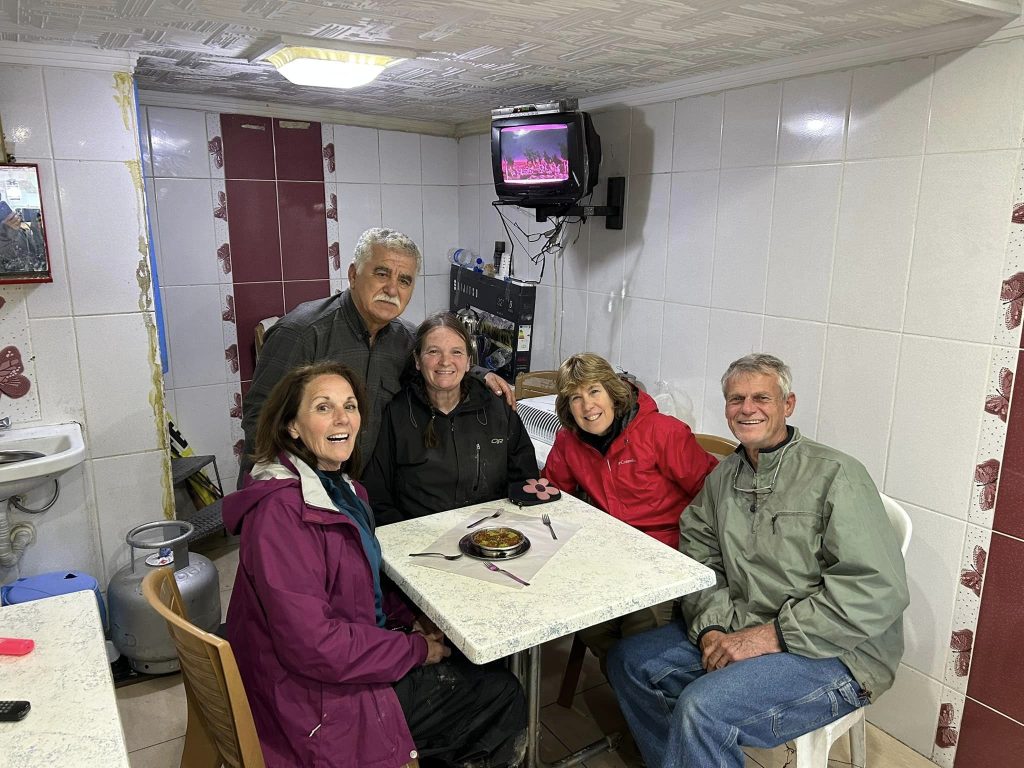
Not everyone is called to go physically into war-torn, earthquake-ravaged countries to administer aid, but everyone is called to care, to be compassionate. What is your role?
Raise Your Hand if You’re a Mama!
By Lisa Zanoni, World Relief Spokane Relationship Manager
Raise your hand if you are a mama! Or have a mama. As a mother, or parent, we want our children to be safe and happy. Many of us have made the decision to move away from our family. The reasons are vast: we fall in love; we get a job transfer; we go to college and just never return to our home. I am a southern gal, born and raised in North Carolina. In southern culture, children, especially daughters, don’t venture far from the nest. I am an exception. I fell in love, married a man, and moved to Spokane 29 years ago. I know I ripped my mama’s heart out of her chest. The saving grace was the knowledge that I knew I would be visiting my family frequently. I had, and I still have, the freedom to buy a plane ticket and go home anytime I please.
But what if seeing my family wasn’t even remotely a possibility? What if that tear-laden, heart-wrenching goodbye in 1994 was the last goodbye?
I want to introduce to you Hamsa, Masar, and their three precious daughters. Here is her story of heartache, success and a beautiful reunion!
“My husband, Masar, 14-month-old daughter, Lina, and I moved to the United States in January 2013 as immigrants from Iraq through a program called *Special Immigrant Visa (SIV). Masar and I both worked as contractors for the U.S. government as interpreters. Subsequently, our lives were under threat during the widespread civil war and the harsh service conditions in Baghdad. Threats on our lives for serving with the U.S. military had become too common. The decision to leave Iraq was made when we came home to a gift-wrapped bullet on our front porch. Knowing everything and everyone we would leave behind; this was not an easy decision to make.
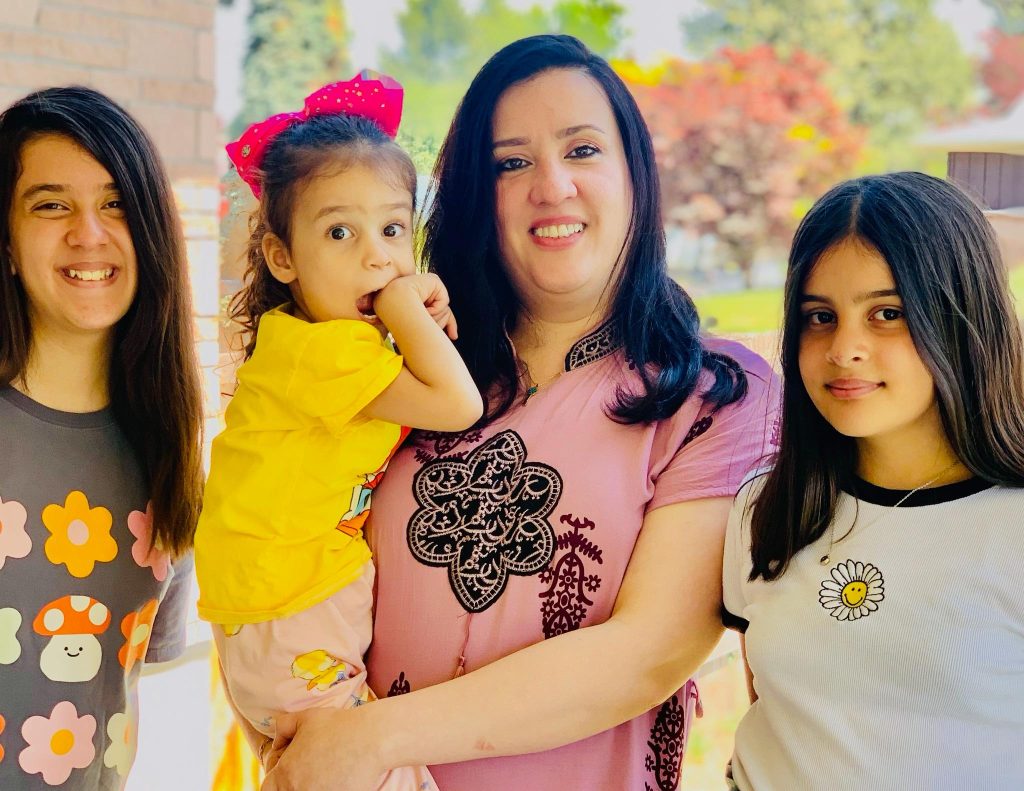
Due to the lack of security for our family, and fear of the retaliation that might be taken against my family, I was unable to tell anyone about my plans. I couldn’t even tell my mother. Keeping that secret from her was extremely difficult, but I knew that in order to keep her and my siblings safe, I dare not say a word. Therefore, I told my mother a week before my flight to the United States. We cried as we held each other close, knowing full well that this was probably the last time we would see each other, hug each other. The last time she would see her granddaughter. She was not ready for the separation, but at the same time she wanted a safe and better life for me. She knew she had to let me go in order for me and my little family to live. The day I said goodbye to her and my four siblings was one of, if not the, hardest day of my life.
We flew to US in January 2013, and I still vividly remember the day we arrived in Spokane ten years ago. It felt like magic where Christmas decorations were still being displayed everywhere. I was as excited as a child about our new life! World Relief and especially Lisa West-Zanoni played a great role in my life here from day one to this moment! They assisted us in the resettlement process and helped us to adapt to the new environment. In fact, World Relief staff treat immigrants and refugees as family members or friends. This had a huge impact on me and my family when we arrived to Spokane. Therefore, I am thankful to them. I also would like to give special thanks for Lisa West-Zanoni who was and is still there to support and encourage me as wonderful mother, sister, and friend!
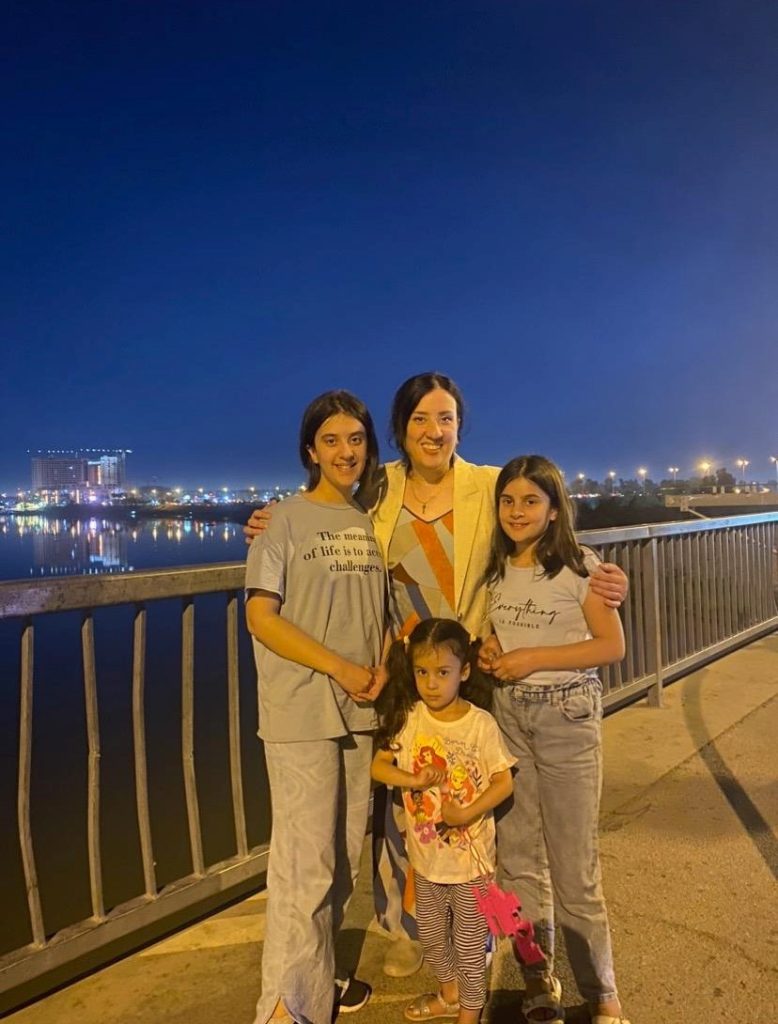
My life in the United States has been challenging and blessed. I encountered multiple obstacles in my life and education journey. I got discriminated against because of the hijab/head scarf that I used to wear. I once was told to speak English at a bus stop. This did not prevent me from going to school. I hold a bachelor’s degree in English from University of Baghdad, and I was determined to continue my education in America and get a job to serve my community. I enrolled in the Vascular Ultrasound Program, and soon after, I got my US citizenship and graduated with an AAS degree! And I have been working in the field for about five years now. Masar and I bought our first house, and our daughters are happy and safe.
Despite our wonderful lives in Spokane, during the past decade, my family was ever present in my thoughts and heart. As primary SIV holder, my husband was able to bring his family to the U.S. As wonderful as it is to have my in-laws here, I was still so desperate to see my mother and for my mother to see her granddaughters. She had not met the two younger girls who were born in Spokane and had watched Lina grow up via FaceTime. I invited my mother and sister to come and visit me on a visitor visa in 2022. Unfortunately, they got rejected. After much discussion with my husband and reports that Baghdad had increased security measures in place, I decided to go to Baghdad and visit them in April 2023. However, I was nervous to go back. Would I be safe? Would I put my family at risk? My longing to see my mother, siblings, and relatives was too overwhelming, and I decided I would trust reports I had heard and take that chance.
The moment I stepped off of the plane and into my mother’s arms confirmed that I had made the right decision. I had four weeks to make up for ten years of separation, four of the most joyous weeks of my life. Very quickly my security fears abated, and instead, stories of missed birthdays and weddings were shared and priceless memories were made. I spent a lot of time just sitting with my mother, cherishing every moment with her. As I closely examined her face and hands, I thought to myself how she had aged. At times, I felt cheated for the hand that had been dealt me and that I was missing these years with her. I knew that she would have it no other way. She had peace knowing that I was safe.
My mother is an amazing cook, and we spent a lot of time enjoying her food. I felt safe as I walked around Baghdad and was thrilled to see rejuvenation occurring. My heart was full as I watched my daughters play with their cousins they had never met. I was thrilled for them to experience their culture that was all around them! It was good to be home and to be surrounded by familiar things that I have missed. But especially to be with my mother.
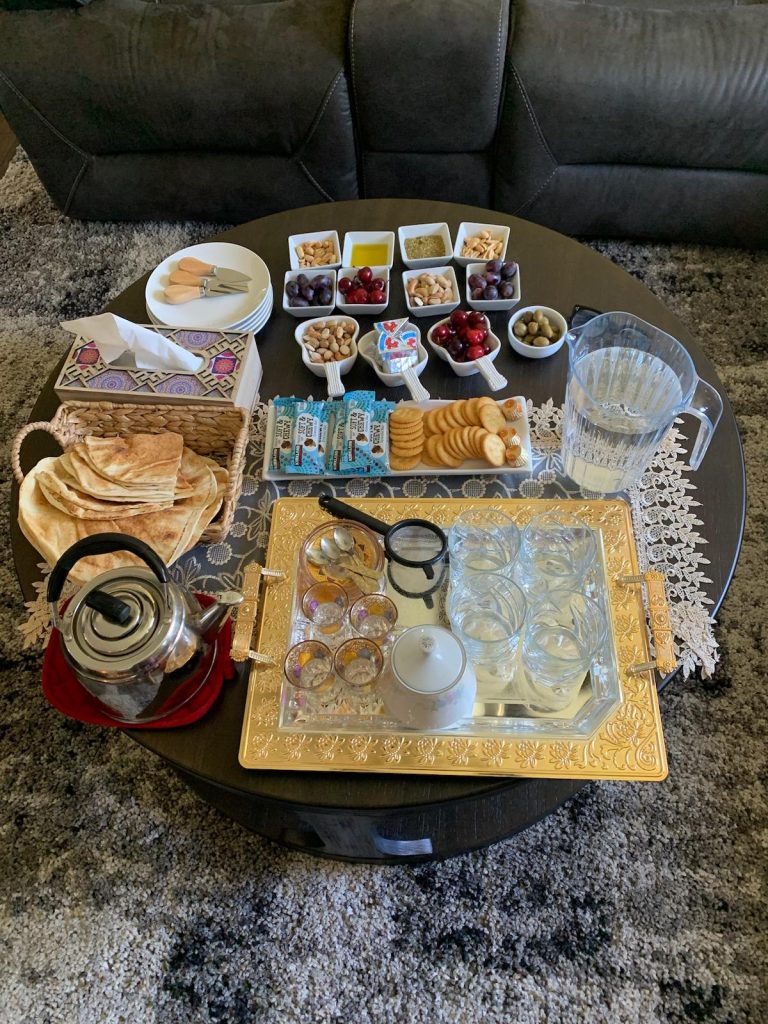
Those four weeks passed far too quickly. There wasn’t enough time. There is never enough time when it comes to our loved ones. The goodbyes this time although difficult, were not hopeless as before. As I left Baghdad and headed to my U.S. home, I was filled with love and encouragement, knowing that this was not the last goodbye.
I don’t know what the future holds for my family, but I am going to do my best to make this trip every couple of years. War, fear and persecution can tear our lives apart, but nothing will ever separate my mother’s love from my heart.
As we discuss the lives of those from Iraq and their struggle, please consider making a donation to support those coming to Spokane for a new life.
*SIV is a program for Iraqi and Afghan nationals who served alongside or worked with the U.S. government. SIV recipients legal permanent residents of the United States.
10 Books to Read This Summer
If you’re anything like me, you love a good book list — especially for summer. The sun is brighter and the heat invites us to bask in the delight of a season that reminds us to rest and make space for fun. I recently asked my co-workers at World Relief what books they’d recommend for our summer reading list and today, we’re sharing a few of those recommendations.
Whether you are looking for a book to read poolside, on your next flight or at home in the cool evening, we hope this list of varied experiences and notable voices helps engage your mind and your heart this summer!
“We read to know we aren’t alone.” C.S. Lewis.
- Americanah by Chimamanda Ngozi Adichie – Chimamanda’s fictional story about a Nigerian couple separated by war, forced to take separate paths in completely different countries while boldly commenting on today’s realities in race and class promises to leave you different than when you began it. It’s no wonder this book made it onto countless Best Book of the Year lists.
- Beyond Welcome: Centering Immigrants in Our Christian Response to Immigration by Karen Gonzalez – Former World Relief staff member, Karen Gonzalez reminds us how centering immigrant voices when discussing immigration is not only important but critical to following a gospel-centered approach to how we advocate for, vote on and learn about the marginalized. A must-read for anyone looking to take their advocacy and solidarity to a deeper level and a top resource we recommend in learning about refugees and other immigrants.
- Creating Cultures of Belonging: Cultivating Organizations Where Women and Men Thrive by Beth Birmingham and Eeva Sallinen Simard – Co-written byWorld Relief’s very own, Eeva Sallinen Simard, this book explores how faith-based organizations can create and sustain a safe work environment for a diverse workforce to flourish. With practical steps and solutions, Creating Cultures of Belonging will inspire you to bring change and best practices to your own organization.
- Everything Sad is Untrue by Daniel Nayeri – This young adult autobiographical novel has won countless awards for its immense heart and masterfully written storytelling. It tells the story of Daniel and his family’s journey as Iranian refugees seeking asylum in the U.S. after his mother embraces Christianity. Daniel shares what it’s like to cope with forming his identity while navigating a new culture in a new world.
- His Testimonies, My Heritage: Women of Color on the Word of God by Kristie Anyabwile – This inspiring collection of stories written by women of color from different cultural backgrounds will leave you in awe of God’s intentional purpose for his daughters. As a Latina Christ-follower, these words ministered to my whole self and reminded me of how a good God perfectly created us to do his work in a multicultural and diverse world.
- Social Justice for the Sensitive Soul by Dorcas Cheng-Tozun – Often times when we think of advocacy or working in social justice, we think of loud marches or individual voices speaking out to the masses. While that is a small part of it, Dorcas highlights the vital role the quiet observers and thinkers play in the pursuit of justice while freeing us from the myth of an ideal activist.
- The Stranger At Our Shore: How Immigrants and Refugees Strengthen the Church by Josh Sheriff – Josh shares his personal story of leaving Islam as a child into a new life in Christ while speaking into a new vision of what missions can look like and discipling to people different from yourself. I’ve had the pleasure of witnessing Josh’s commitment to God’s people when he was a pastor at a local church in Chicago. I know that anyone who reads this book will glean so much wisdom from his experience and devoted heart.
- The Next Worship: Glorifying God in a Diverse World by Sandra Van Opstal – Worship does not look any one specific way. If we are joining together in church with God’s creation in mind, then our worship is full of all tribes and all nations- honoring the many ways he has made us to glorify him. Sandra dives deep into what that looks like and her expertise will convict you into bringing this wisdom to your church, your life and your own worship.
- This Here Flesh by Cole Arthur Riley – This book of reflections and life lessons from Cole’s family history while written in prose, is pure poetry. Cole’s writing will remind you of the beauty of the written word and her insights will serve as a balm to your soul. If you only read one book this summer, let it be this one.
- Thou Shalt Not Be A Jerk: A Christian’s Guide to Engaging Politics by Eugene Cho Gear up for the upcoming election season by learning how to engage in healthy and graceful (God-centered) political discussions. Eugene’s book boldly confronts the challenges we face today in talking about why politics matter, how to live out your convictions while loving the very people you disagree with and how those convictions should be Bible-centered vs. directed by political party agendas.
Enter the Summer Book Giveaway
This summer we are giving away 3 books from the list above. Fill out your information below for a chance to win!

Jessica Galván is a Content Writer at World Relief. She is passionate about storytelling and amplifying diverse voices to reveal the beauty of God’s creation. She is also the Editorial Director for Chasing Justice and prior to World Relief, she was a freelance writer and editor for a variety of clients in publishing, most recently Penguin Random House. When she isn’t wordsmithing for the pursuit of faith and justice, she is spending time with her husband and their 3 children in the Houston, TX area.
5 Ways to Learn More About Refugees
“No one leaves home unless home is the mouth of a shark.”
— poet Warsan Shire
By Lisa Zanoni, World Relief Spokane relationship manager
103 million people have been forcibly displaced from their homes, up from 89.3 million in 2021. 32.5 million of those displaced people are considered refugees, having fled across an international border due to war, violence, conflict or a well-founded fear of persecution. 32.5 million. That number is not only record-breaking but heart-breaking, as well.
The past two years have brought crisis after crisis. We are approaching the two-year anniversary of the fall of the Afghan government to the Taliban. Ukraine is in its second year of war with Russia. Currently, two generals are battling over power in Sudan. Since August 2022, clashes have resumed between the DRC‘s military and rebel group M23. A collapsed economy and political unrest have been forcing people out of Venezuela since 2015.
I don’t know about you, but these numbers and this information can overwhelm my brain and my heart. Often times we don’t know how to help. Or even if it’s our responsibility. Where do I begin? It just feels too big for me to make a difference.
I believe the most basic way to answer some of these questions is to learn more about refugees! They are so much more than random people from a different country who fled because of a war. These resilient human beings are young mothers, older mothers, single mothers, widows, daughters, sisters, husbands, fathers, brothers, sons, uncles, infants, toddlers and school-age children. They are best friends, entrepreneurs, science teachers, English professors, heart surgeons, day laborers, truck drivers. And they have fled for their lives.
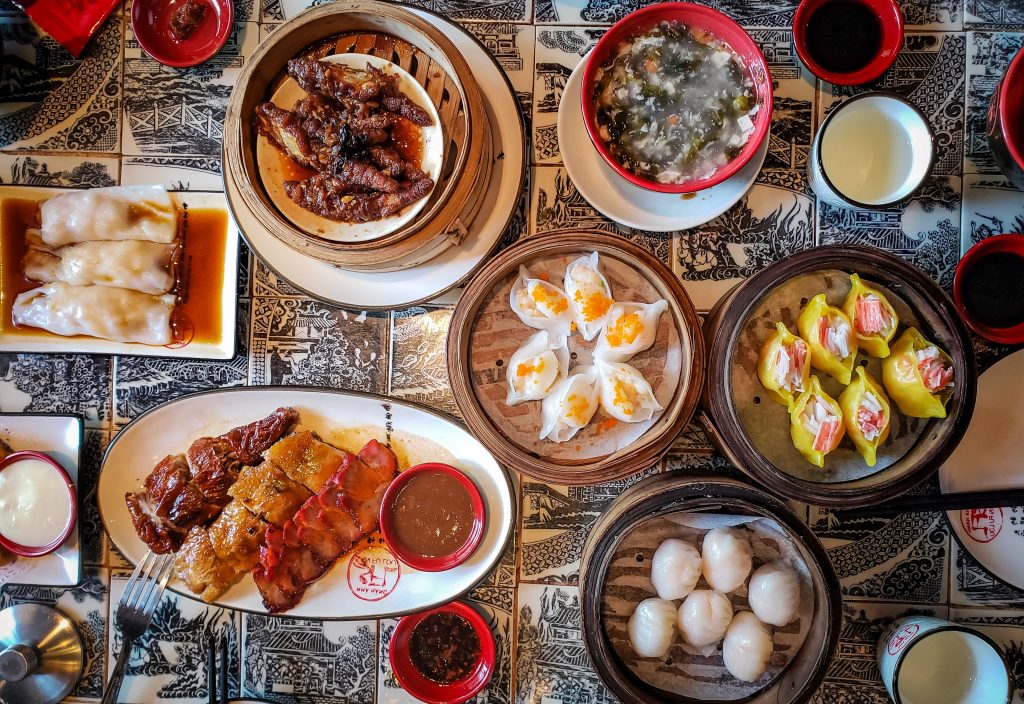
World Refugee Day
Some really exciting news is that June is World Refugee Awareness month, so let’s be aware! Here are five ways you can learn more about refugees in Spokane, WA!
- World Refugee Day is a day where we pause and reflect on the plight of these, our sisters and brothers. Attending a World Refugee celebration is a great starting point to see your refugee friends in action. Eat their food, buy their wares, listen to their music. Your heart won’t be the same! We will be celebrating World Refugee Day on June 17 at Nevada Playfield.
- Visit the MAC to see the exhibit Humaira Abid: Searching for Home, featuring the artwork of Seattle-based, Pakistan-born artist Humaira Abid. The beauty and mastery of Humaira’s woodcarvings of seemingly benign objects belie the upheaval and instability in society, especially that to which women are subject. Searching for Home presents a human-scaled look at the worldwide refugee crisis focusing on the plight of women and girls, who make up a disproportionate percentage of the millions who have fled their home countries as a result of political conflict and strife. The works demonstrate the artist’s ability to tread a narrow line between evocative (and often provocative) content and mastery in a material discipline.
- Eat a meal at Feast World Kitchen. Feast World Kitchen serves the best ethnic food in Spokane, and all of their food is prepared by refugees and immigrants. You can even meet the chefs when you are there. Food is available for dine in or take out.
- Watch a TED Talk. TEDxTalk: One Refugee’s Life Experience | Come Nzibarega Born and raised in Burundi, Come Nzibarega shares his story of escaping torture and civil war. Come was resettled by World Relief Spokane and is currently working as an Employment Specialist for World Relief Tri Cities. Hear more of his story and why Come thinks refugee camps are the richest places in the world.
- Gather your friends and family and participate in a refugee simulation at World Relief Spokane. You will gain a fresh perspective on what refugees face during their UNHCR interview as you participate in this immersive two-hour program.
- BONUS: Read a good book. Book: Inalienable: How Marginalized Kingdom Voices Can Help Save the American Church U.S. churches are at a critical crossroads — blurred lines between discipleship and partisanship have compromised our witness and confused our national and individual responses to refugees and “the stranger.” In a new book, pastor Eric Costanzo, missiologist Daniel Yang and World Relief’s Matthew Soerens find hope in the witness of global Christians, the poor and the ancient church.
Morella: Venezuelan Hospitality
by Kallie Kohl, World Relief intern
Don’t walk in front of me… I may not follow.
Don’t walk behind me… I may not lead.
Walk beside me… Just be my friend.
–Albert Camus
At World Relief Spokane, a delicious smell drifting through the offices hints that golden-brown rounds of fried corn dough with melted cheese are about to be served with a side of lighthearted laughter and encouraging fellowship. An onlooker might see employees disappear from behind their desks with an exclamation of “Morella’s cooking arepas!”
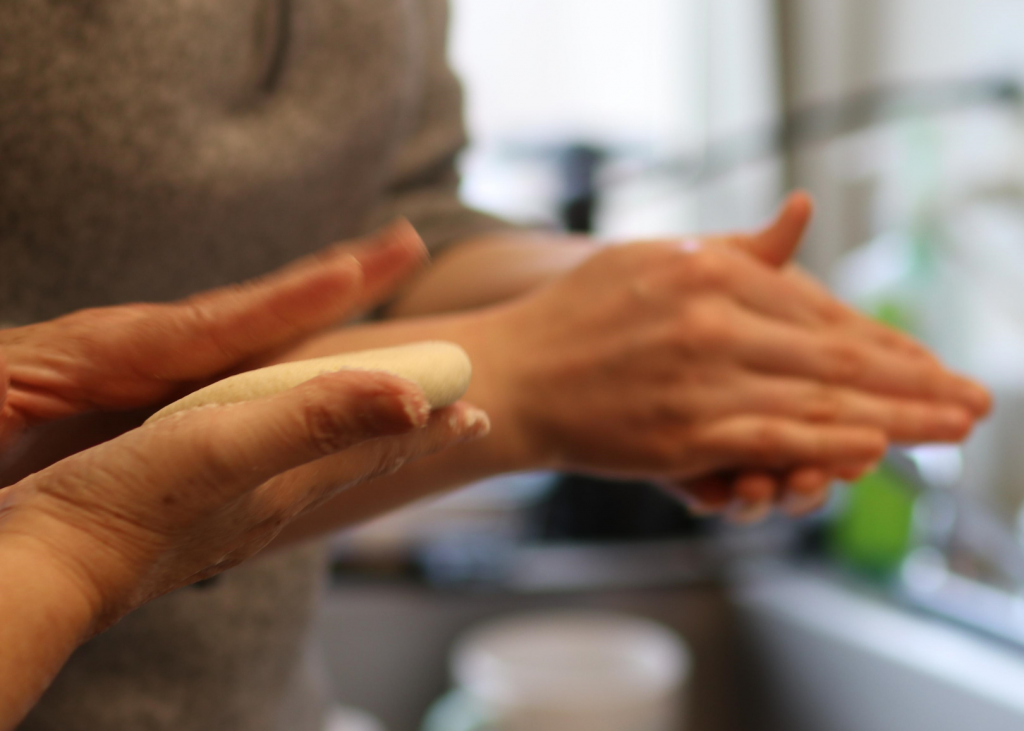
Morella Perez-Suels, also known as “Tia Morella,” is the woman to praise for this traditional tasty corncake, the Latin version of grilled cheese which has also been featured in the Disney movie, Encanto.
As the Education Services Manager, Morella wears many hats, and hospitality permeates them all. Morella started a brand new initiative for World Relief Spokane last fall – offering the deeper training and education refugees and immigrants need to flourish in their new homeland. Basic Computer Skills for Afghan women was the first class, followed by Financial Literacy for Afghan men. Citizenship classes in civics and history have been added, as well as Conversation Club, Textile Arts with an emphasis on entrepreneurship, and more to come. The Education Center also holds one-day workshops for energy assistance in connection with SNAP and other initiatives as needed.
Morella recognized that the Afghan women in her first Basic Computer class needed much more than technical skills. They needed connection with each other and with the outside world. Each week, she set out teas and treats to welcome them. She helped entertain their children so the mothers could learn. She listened and never rushed. When they needed more time, she added onto the schedule.
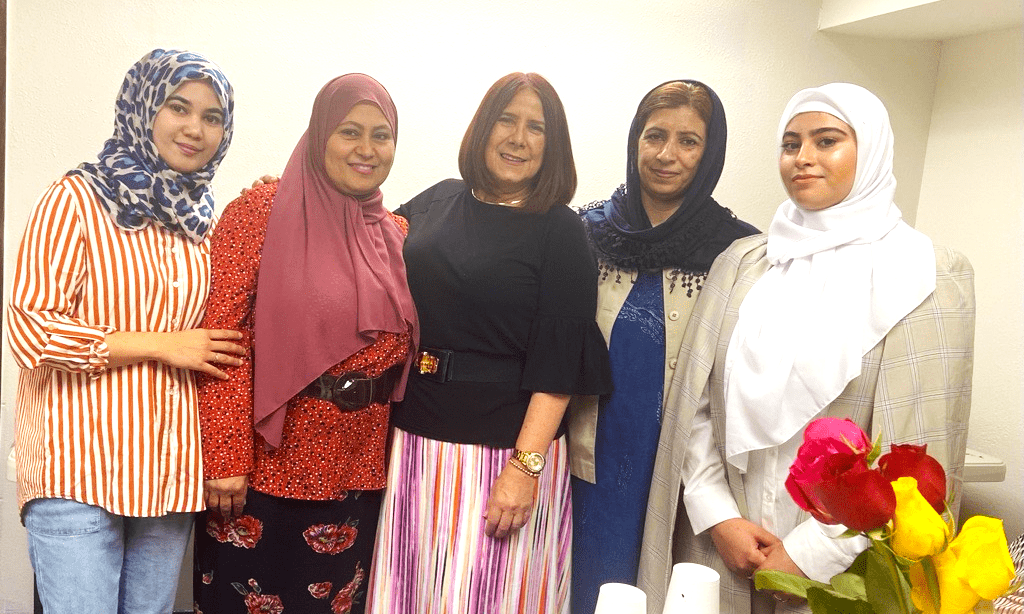
Morella was born in Caracas, the capital of Venezuela, but lived in sunny, mountainous Margarita Island in Northern Venezuela. Six years ago, she came to the U.S. due to what she describes as the “very bad political and social situation,” which has caused more than seven million Venezuelans to flee their country. (Want to know more? Click here: https://worldrelief.org/blog-private-sponsorship-opens-path-for-venezuelans-heres-what-you-need-to-know/ ).
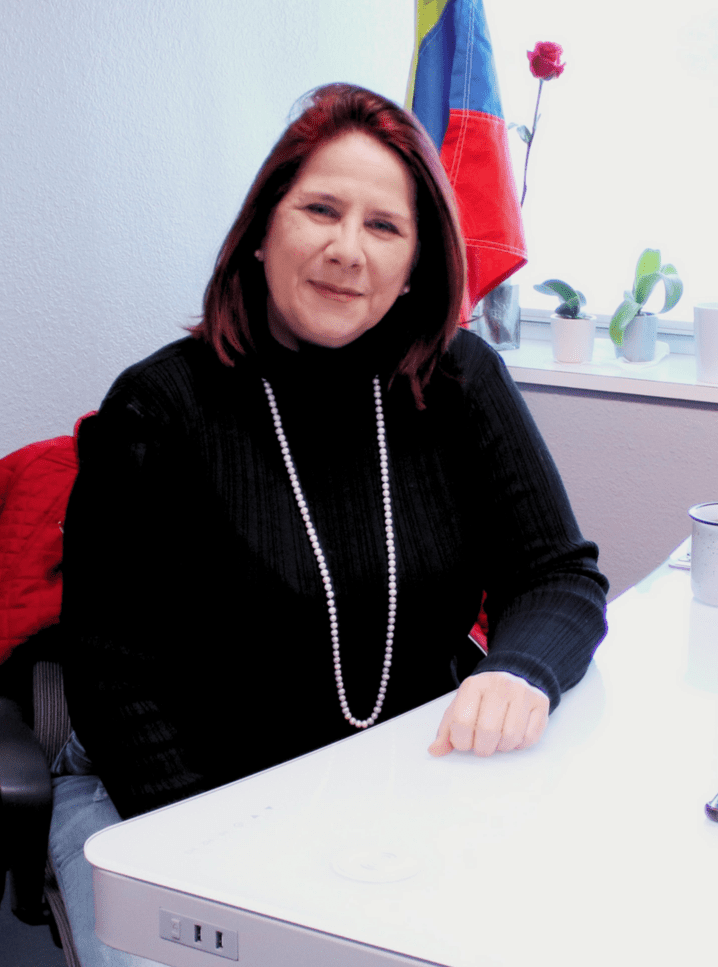
Over a year ago, Morella saw an opportunity to work at World Relief Spokane. She pondered the consequences of moving far away from family in New Jersey, ultimately placing the heavy decision into God’s hands. She prayed, “God, your plans are bigger than my plans.”
Now, happily for the growing community of immigrants and refugees receiving wraparound support in Spokane, she works as the Education Services Manager, equipped by her faith, her hospitality and the legacy of her family.
Morella grew up in a large family enfolded within a culture that valued openness and showed kindness by helping others. As a child she delighted in making desserts for her grandparents and loved her cooking lessons from her Colombian babysitter. She said, “The best teaching or experience we had…was how to share the love in the family.” Her parents believed that getting a good, thorough education was a bigger gift than any material inheritance they could give her. Thus, Morella’s family legacy was not only knowledge and wisdom, but the ability to truly love and serve others.
One day, weeks into her new job, Morella made arepas for a few coworkers. Her unwritten recipe used cornmeal, salt, and water. After that first time sharing the inexpensive, flavorful and filling gift of food with her coworkers, Morella said, “When I cook arepas, like a flight they come to the kitchen, and say ‘Morella’s cooking arepas!’”
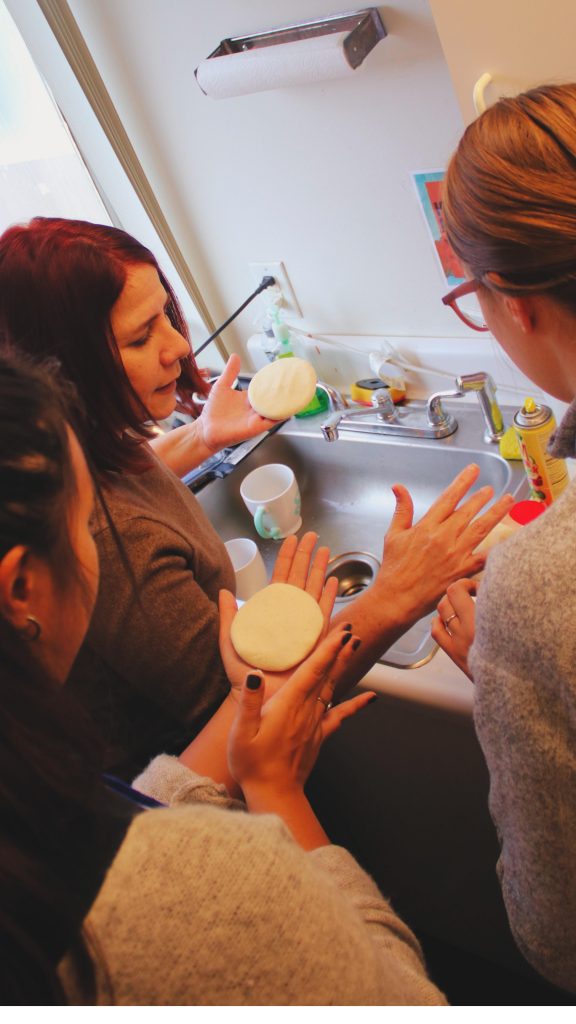
When Hannah, an Integration and Wellness specialist and Morella’s unofficial adopted “sobrina,” celebrated her birthday, Morella promised to teach her how to make satisfying arepas stuffed with melty cheese on one condition: Morella told her, “I’m not going to cook; I want you to learn!” True to her word, Morella showed Hannah the way to combine warm water with cornmeal using a fork, flatten the dough between moistened palms, and shape them into perfect flat rounds to be put on the griddle until they turn golden brown with spots of beautiful char. Then, using a knife, Morella created a pocket and filled them with delicious cheese. When Hannah shared about her lesson later, she said, “Morella always told us, arepas are not just filled with cheese but filled with beans, and meat; there’s so many recipes about what you can put in it.”
Hundreds of online arepas recipes and videos could not compare to the vibrancy and passion in Morella’s voice and hands as she taught. By the end of the hands-on lesson, a few more staff and interns wandered into the kitchen to enjoy the perfect snack. With each bite, they felt the love of generations of open-handed women filling hungry bellies. In the following weeks, Hannah and her husband paid this unique birthday experience forward by making their own arepas for friends several times. Hannah said, “[Morella] shared her love, which moved us to share love with our friends!”
Later, she witnessed a need for financial help, and tailor-made another class to fit the needs of those World Relief Spokane serves. She is constantly listening to the needs of the communities.
Just like Morella’s real-world cooking lesson, she is always looking to help others in a caring way, without solving their problems for them or enabling them. She is appreciated, treasured and loved by all who meet her, and her World Relief Spokane community, staff, volunteers, and clients are a blessing to her. She said, “World Relief is a gift from God. I can say I am so happy. For me, cooking for others is one more way to express love and gratitude.”
We are always looking for conversation partners, sign up to volunteer.
BEYOND 90 DAYS: Intensive Case Management
By Cade Hajovsky, Fall Intern
What Is Intensive Case Management?
Not all newly arrived refugees can become self-sufficient and independent in 90 days. Many immigrants need more support. Through our Integration and Wellness department, World Relief provides case management to those struggling to get established. Case managers help clients navigate the health care system, legal resources, housing and financial management services, educational services and more. They connect clients with other agencies who provide direct services, while coaching them in accessing services and resources. The goal is to empower clients and connect them with support systems (physical, emotional, social) as they adjust to life in America.
Volunteers can be a significant help in this process by walking alongside families as they figure out their tight budgets, work on their language skills, learn the culture, and build a network of support. They often bring a wealth of experience and knowledge and still report back that they also learned and grew through the experience.
The purpose of Intensive Case Management is to offer services and help from World Relief beyond the initial 90-day resettlement program — up to 5 years after arrival. Intensive Case Management is one of three teams in the Integration & Wellness Department, which serves hundreds of clients each month.
Integration & Wellness
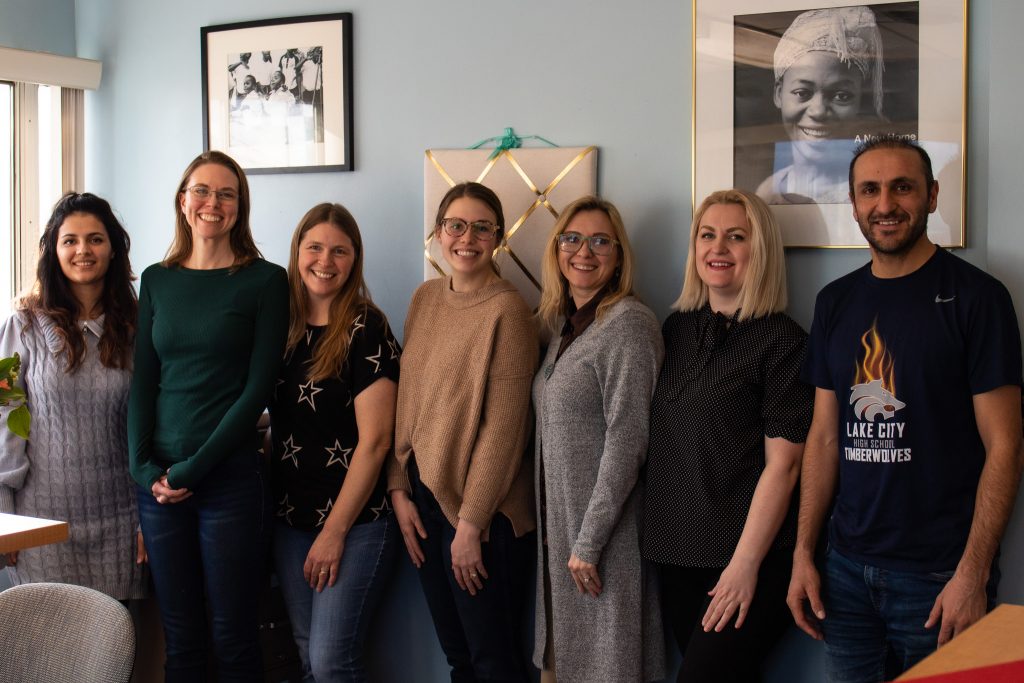
Andrea Simpson, Director of Integration & Wellness, has been at World Relief since 2008. She began her work as a case manager within the resettlement department, worked her way up to supervisor, and now serves on the leadership team. Within her role, Andrea oversees three teams: Intensive Case Management; Education Services and the Friendship Center/Community Ambassador Team. Intensive Case Management encompasses two programs: Preferred Communities (PC) and Promoting Refugee Integration, Mobility and Empowerment (PRIME).
PC is a program that receives federal funding and supplemental state funding. PRIME is funded by the state. Each of these programs consists of employees who work one-on-one with refugees and their families to overcome challenges. Generally, each case manager works with 10-15 clients at a time.
The time that clients stay within Intensive Case Management programs varies, but the goal is to provide support to our new community members for as long as needed. The case managers in the PC program have a 1-2 year track with a minimum of six months. In PRIME, there is no definitive timeline, a refugee could re-enroll every year until they are no longer eligible (five years). This is a rarity, however, as the purpose of Intensive Case Management is to move clients toward self-sufficiency. Long-term engagement generally only happens if there are extenuating circumstances that would cause someone to stay in PRIME for a longer amount of time, typically medical needs.
In addition to the PC and PRIME programs, Andrea also oversees the Education Center. The Education Services team launched last year and is currently hosting small group education classes on finances, computer skills, housing, and more. Morella Perez-Suels, Manager of World Relief Education Services, believes strongly in working to understand the needs of clients first and then craft educational programs to help fill the gaps.
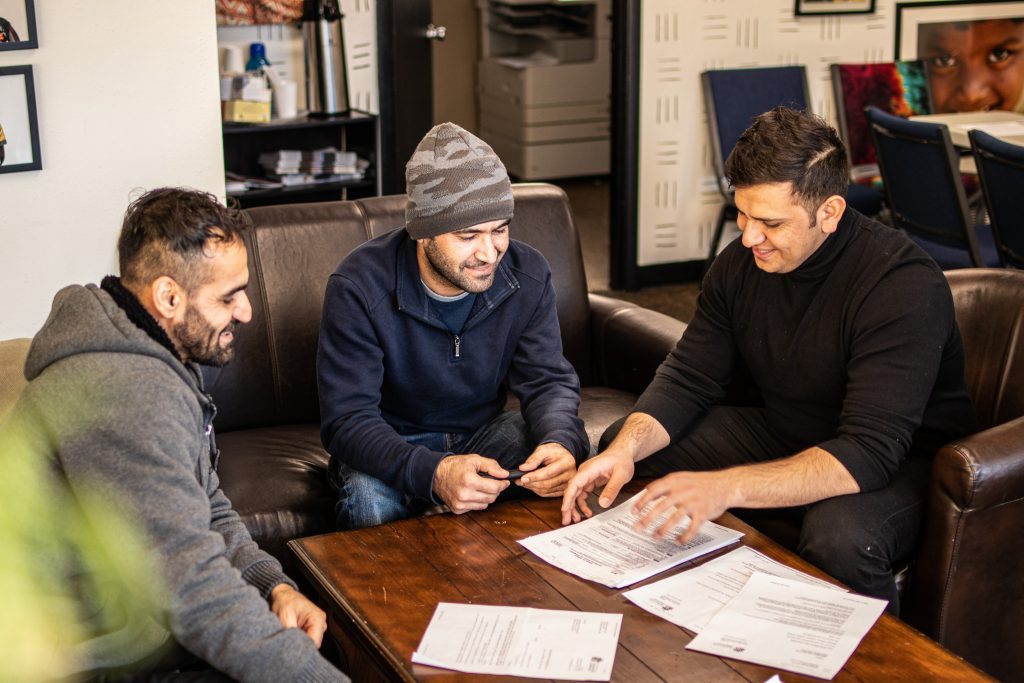
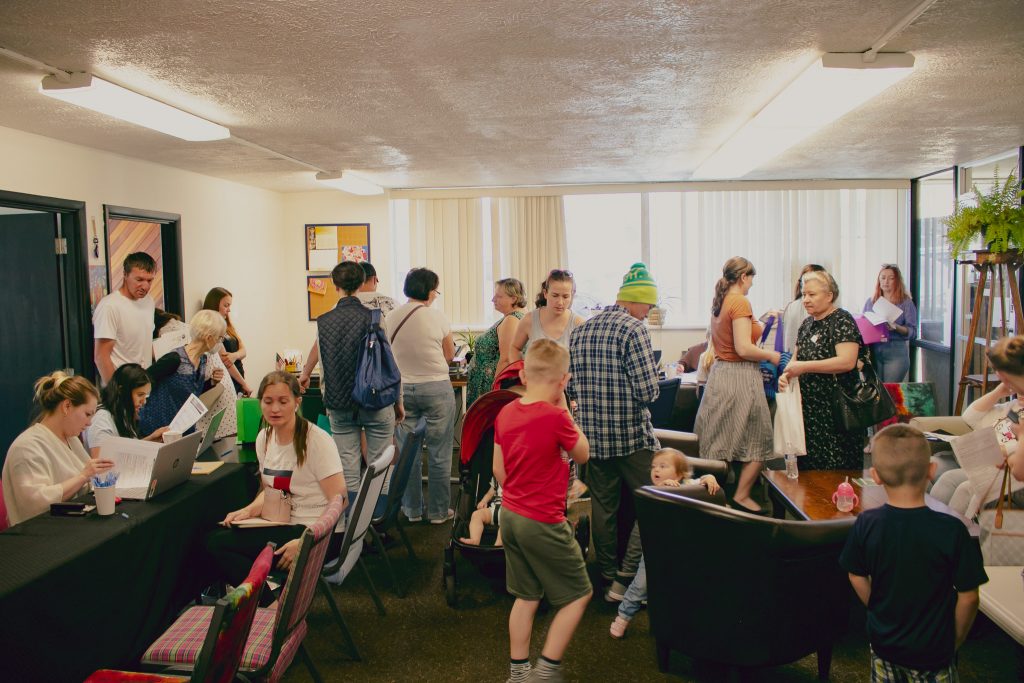
The Friendship Center is home base of the Community Ambassador team, a program birthed during COVID which has become an invaluable means of connecting with the various immigrant groups within Spokane. Community Ambassadors are already leaders within their individual communities, so they can serve as a bridge between World Relief and the various immigrant groups — letting World Relief know about the needs their community is experiencing and relaying word about available resources back to the communities. Ambassadors help in a wide variety of roles — interpreting and translation, helping to fill out paperwork, delivering food boxes, taking children on field trips to the roller rink or Mobius, connecting families with the Farmers Markets, etc. Melissa Stipek, who oversees the Friendship Center and the Community Ambassador program, describes the Friendship Center as “the happy side of World Relief.”
“I believe for people to be able to flourish, they need to be happy. When people are happy, their mind clears, and they are open to new ideas.” — Melissa
Client Challenges
New immigrant families face a host of challenges, such as language, housing, financial management, schooling, transportation, childcare, healthcare. The first focus area of Intensive Case Management is helping families address these obstacles so that they can stabilize and not be in constant crisis. Secondly, they help refugees build a firm foundation and move forward into integration and empowerment.
The top two challenges case managers address are housing and finances.
“When families first arrive, they do not have very many options for housing as they do not have rental or credit history, which often leads to them not getting their ideal housing,” Andrea said. “Also, with housing prices going up, there have been issues with families not being able to find affordable rent.”
Families who arrive through World Relief’s resettlement programs are initially paired with the resettlement teams who diligently work to find them housing. Intensive Case managers get involved with housing later down the line and generally work with families looking for their second home, not their first home.
In addition to assisting with housing, case managers help clients budget, apply for jobs and programs, and teach them how to connect with different resources.
“Intensive Case Management is necessary because if you picked up tomorrow and moved to another country, you would have lots of lessons to learn,” Andrea said. “How do I get a phone? How do I get from here to there? How do I pay for this? What if I want to buy a house? How do I support my children? Everything you want to do, you have to learn anew.”
As soon as they arrive in the United States, refugees are learning how to navigate life in the United States, which includes the need to understand technology. The digital climate of the U.S. requires people to know how to navigate the internet and complete tasks online, such as applying for a job. For someone who has never used a computer before, this can be a very difficult transition. Through the Education Center, immigrants are learning how to navigate the online world.
Through help with housing, transportation, education and finances, the main goal of the Integration & Wellness department is to help refugees gain confidence and get to a point where they feel comfortable navigating life without as much support from World Relief.
Self-Sufficiency
The mission of World Relief is not simply to make sure a refugee is in a home and has a job; it is to walk with them until they are in a position to flourish in their new home.
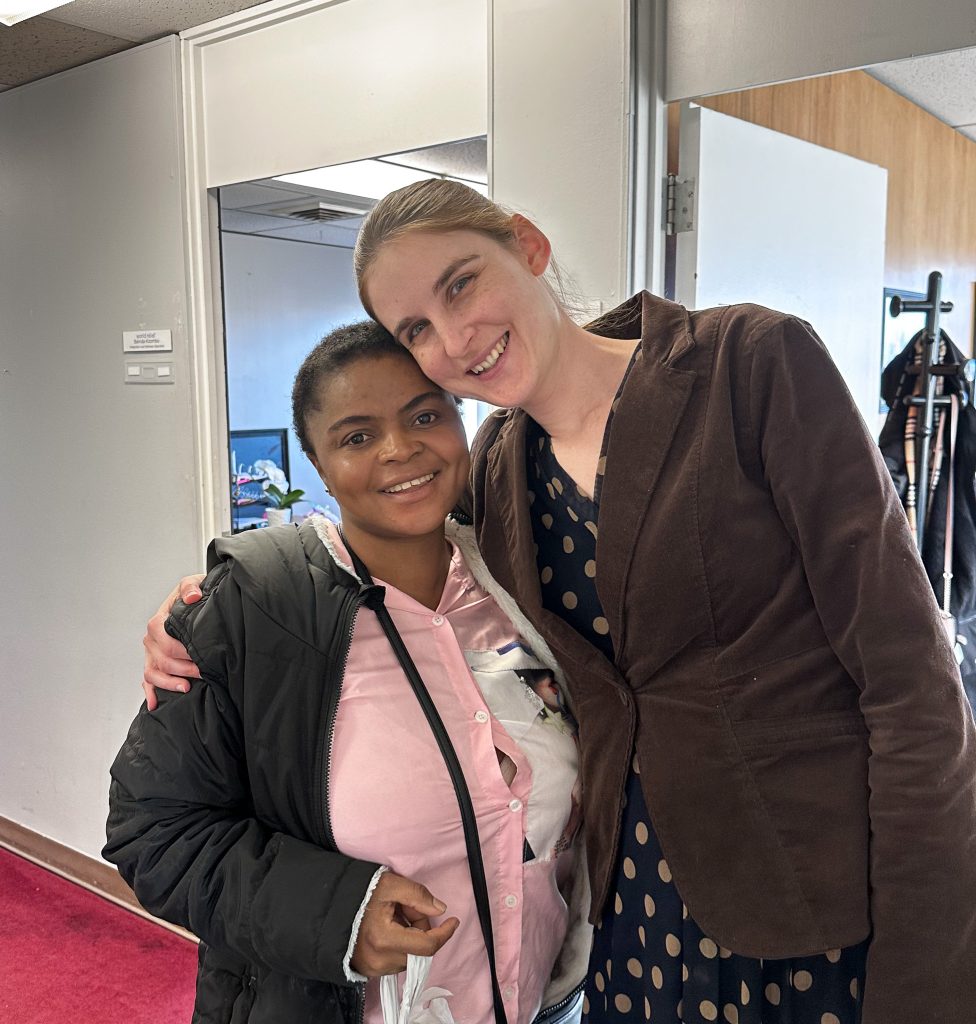
“Integration and Wellness is all about empowerment,” Andrea said. This process is executed through setting goals that help refugees build stability.
While a refugee can enter into Intensive Case Management as soon as their time with the resettlement department is over, this is not normally the case.
“Everyone hits that wall, usually after they have been here for six months, where they say, ‘This is not what I expected,’” Simpson said. “’The people, the food, the housing, the job, it’s not what I expected.”
When this time comes, the Intensive Case Management team welcomes refugees with open arms and works diligently to assist them in their struggles. Stability is not built overnight; it is a process of gaining confidence, skills, and experience that lead to this sense of empowerment for refugees.
At World Relief, we never want refugees to feel alone on this journey. We work to provide them with the resources and connections they need to succeed and feel empowered, and the work of Intensive Case Management greatly contributes to this mission.
5 Things You Should Know About the Earthquakes in Turkey and Syria
Early in the morning on February 6, massive earthquakes hit Turkey and Syria. For many of us who live thousands of miles away from the devastation, it can be hard to imagine the profound scale of loss — and even harder to know how best to respond.
And yet, if you’re like us, your faith compels you to respond.
At World Relief, our mission is to empower the local church to serve the most vulnerable. When natural disasters like this one occur, those who are already in vulnerable situations are put at even greater risk. By responding together, we can extend the love of Christ to those who are suffering in their greatest time of need.
That’s why we’ve shared five things you should know about what’s happening in Turkey and Syria, why we at World Relief are responding and how you can join us in praying for and serving those who are suffering.
1. How widespread is the impact of the earthquakes?
The earthquakes struck in the early morning hours in a region that has not experienced a major earthquake in over 200 years, leaving residents little prepared. As a result, the devastation has been widespread and severe.
At the time of writing, an estimated 36,187 have died in Turkey and more than 5,800 in Syria — and these numbers continue to rise. More than 5 million people across Syria are now in need of shelter while nearly a million more men, women and children are now homeless in Turkey as a result of the earthquakes. Basic infrastructure, including power and water, has been completely demolished in some areas.
The earthquake’s devastation is further compounded by freezing winter temperatures and, in Syria, decades of civil war have left residents especially vulnerable.
2. What are the greatest needs and how is World Relief responding?
As those impacted grapple with freezing temperatures, decimated infrastructure and profound loss and trauma, the greatest immediate needs include shelter, water, power, blankets, non-food and sanitary items and psychosocial counseling.
World Relief is responding on the ground through long-standing, trusted partners, including Tearfund Germany and the Integral Alliance. Our partners are connected with local churches and organizations in Turkey and Syria who can more quickly deliver aid — especially in hard-to-reach regions or where international aid may be restricted by governing authorities due to protracted conflicts.
Our local partners are working especially hard to provide assistance to the most vulnerable, including the elderly, children and persons with disabilities.
Thus far, our response efforts have included:
- Establishing mobile kitchens and distribution centers for food, water, hygiene supplies, emergency shelter, heaters, batteries, tools and more
- Operating mobile hygiene trailers that offer toilets, showers and washing machines
- Facilitating a kids club and trauma counseling center for children impacted by the disaster
- Providing mobility devices such as wheelchairs, protheses and walkers to those who need them
To stay up-to-date on how we’re responding to this and other crises around the world, sign up for our mailing list, here.
3. What will happen after the initial response?
Natural disasters on the scale of what we’re seeing in Turkey and Syria affect every facet of life. Responding immediately is essential to ensure the survival and safety of as many people as possible. At the same time, we at World Relief understand that rebuilding and restoring what has been broken — whether infrastructure or lives — takes time and commitment.
That’s why we’re beginning conversations with our trusted partners in the region to determine how we can best come alongside local communities so that they not only survive the current crisis, but can flourish and thrive in the future. In places like Syria, which have already been wracked by unimaginable conflict and loss, this commitment is all the more important.
4. Has World Relief worked in the affected region before?
Yes! World Relief formerly had programming in both Syria and Turkey which we transferred to our partners at Tearfund Germany in 2019. We continue to have a strong relationship with Tearfund Germany, allowing us to respond quickly and effectively through our partners who are still at work in the region.
Additionally, World Relief has been helping Syrian refugees resettle in the U.S. for over a decade. Members of the Syrian community in the U.S. have become our coworkers, neighbors and friends. We are grieving and praying alongside them at this difficult time.
5. How can I help?
- Pray: As in all things, we first turn to prayer. Pray for those who are still missing to be found, for the injured to be healed, for the hungry to be fed, for the cold and weary to find shelter and for the grieving to be comforted. Pray also for those responding to do so with wisdom and endurance.
- Give: You can rush help to Turkey and Syria by giving today. Your donation will support our partners at work in the region, ensuring more help can reach more people in this time of great need.
- Share: As the news cycle moves on to the latest headlines, you can help keep Turkey and Syria in the prayers of your friends, family and neighbors by sharing what you’ve learned in this blog.
One Year Later: Erika’s Story
When Russia invaded Ukraine in February last year, Erika Symonenko was working as a salesperson for a garage door company. “I went to Germany right after the war started to help some of my family members [who had fled Ukraine].”
When she got back, however, she was desperate to do more.
Being Part of the Solution
“I couldn’t focus at my old job. I was not able to work. My co-workers understood that I will not be able to focus or do anything unless it’s involved with helping refugees… All I could do was check the news, and I knew that I shouldn’t, but I have to know what’s happening, so I kept checking the news and I want to help. The worst feeling is that you are safe when your friends and your church and your family are getting bombed. You’re feeling guilty. So it was a very depressing moment, and the first thing that comes to mind is the only way that you will be able to help is when they start coming here. So when people start coming here, World Relief is going to be the first to respond.”
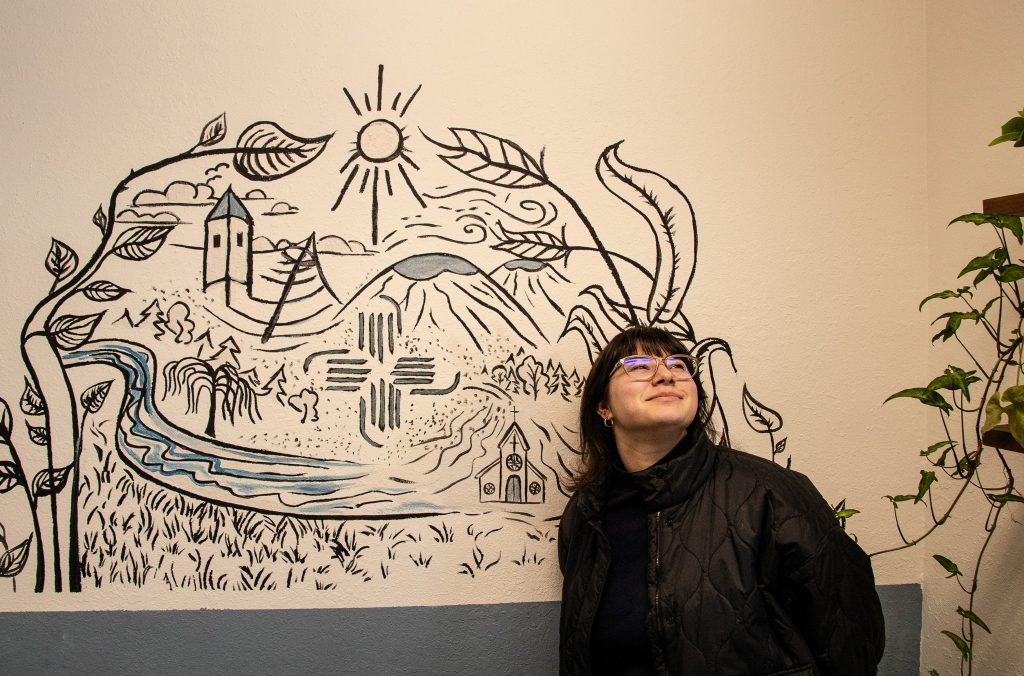
Erika decided she needed to get a job at World Relief. Her old employers offered her a raise to get her to stay. “They would have paid me more than I get here, but in the end, this is what I needed to do.” She started as the housing specialist in April of 2022 .
“The worst feeling is that you are safe when your friends and your church and your family are getting bombed.” – Erika
Immigration in 2008
Erika herself came to the US from Ukraine with her family in Summer 2008. Her story reflects the longstanding, complicated relationship between Russia and Ukraine.
Her family’s church, Irpin Bible Church, was very involved with the Orange Revolution in 2004, a peaceful revolution to protest the fraudulent presidential election in the same year when the Russian-backed candidate (Viktor Yanukovych) was awarded the presidency even though his opponent (Viktor Yushchenko) had received the majority of the vote. Irpin Bible Church, located only 20 miles from Kyiv, provided food, tents, coats, a place to sleep and other resources to the protestors.
“During the whole situation,” Erika said, “we would often be without light or heat because that would come from Russia. They would cut off our resources. We couldn’t do homework. We had to use candles.”
Yushchenko, whose campaign color was orange, was eventually awarded the presidency in a recount in early 2005.
“The protests of late 2004 initially succeeded in preventing Kremlin-backed candidate Viktor Yanukovych from stealing the Ukrainian presidency and made possible the election of his reformist rival, Viktor Yushchenko. However, Yushchenko soon found himself beset by infighting and was unable to lead Ukraine decisively towards Euro-Atlantic integration during what proved to be a hugely frustrating five-year term in office. This paved the way for Yanukovych to mount an unlikely comeback and win the 2010 presidential election race.” (Atlantic Council website)
Erika’s parents became very concerned about their children’s future. “They realized there will be no future for their children to build, and since it is so difficult to get an education and get it transferred to America, they decided they will move here (to the US) as soon as possible.”
Another significant factor in their decision to immigrate to the US was the fact that Erika’s youngest brother has cerebral palsy. “They had friends in Germany and several other countries, but America is the number one country for people with disabilities, so my parents decided it is best. There is so much he receives here that he would not have gotten in another other country.” (Erika’s brother is 21 now and attends Spokane Community College.)
A Rough Start
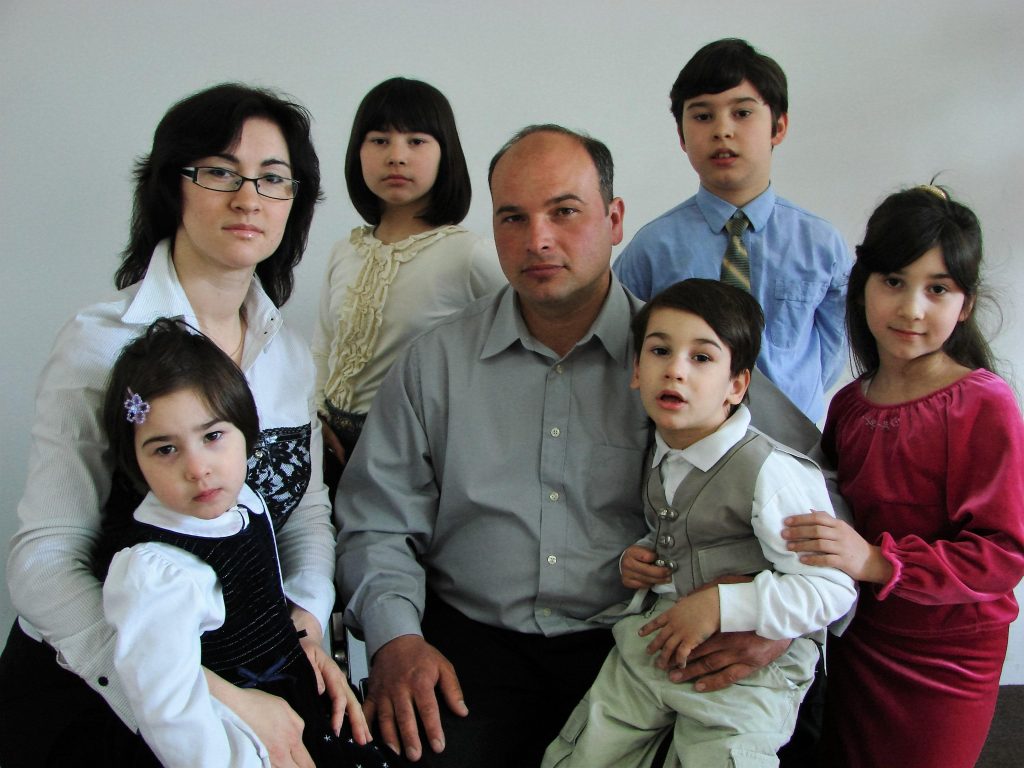
Erika was 11 when they arrived. “They put me in 7th grade because there was lots of confusion… They give me my class schedule, which I had no idea how to navigate, and for some reason, there was no one to go with me to the school, so they just randomly put me in class, and the lady who was supposed to help me navigate the first couple of days, she had her Spanish dictionary with her, and she kept pointing at it, and I would just ignore. And she thought that maybe I was just very traumatized or something, and I can’t respond, but within a couple of days, she realized that I just honestly have no idea what’s going on, and she got really upset and angry, and she kept pointing fiercely in the dictionary, trying to figure out when my birthday is and things like that, and why am I not putting my name at the beginning of the worksheet paper. Later, I found a Ukrainian boy, and I asked him to come up to her and tell her that I don’t speak Spanish, and even though I have dark hair and dark eyes, it doesn’t mean that I am Hispanic.
“We laughed a lot about that later, and now, it’s an ongoing joke, but it was very stressful at the moment.”
According to the Spokesman Review, before the war started, there were roughly 30,000 Ukrainian Americans in Spokane County, the vast majority “Christian refugees who immigrated to the U.S. to escape religious persecution.” A second article estimates 2,500 more have arrived since the war began.
New Arrivals
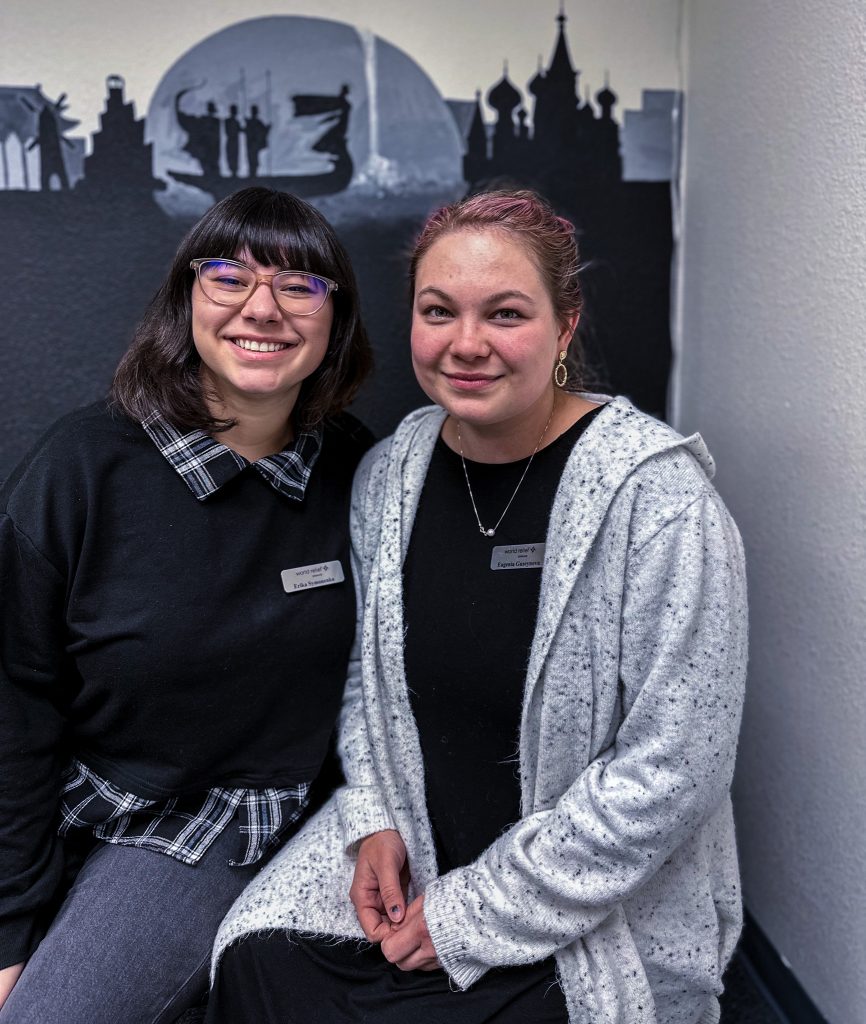
At World Relief, Russian-Americans and Ukrainian-Americans work side by side without conflict. Erika’s roommate, Eugenia (pictured right), is from Russia and also works at World Relief as the pre-arrival coordinator. She knows who is coming when and arranges for each new arrival to be greeted at the airport.
World Relief is able to help the newly arriving Ukrainians with job search, employment and housing stabilization.
“They are also coming here to get information and education,” Erika said, “because everyone when they hear the word ‘refugee’ in Spokane, the first thing that comes to mind is World Relief… Our signs says, ‘help the vulnerable,’ and they don’t have to be registered with World Relief to be vulnerable. Lots of Ukrainian families that come here, we refer them to resources, explain how to find housing, and in the Friendship Center, they have resources.”
Erika has also recruited her mom, Olga, to help as a translator.
“I always wanted to volunteer, but now, it’s time when you need help the most. I see the war in Ukraine; there’s lots of Ukrainian people. I’m trying to help them by myself, but I think it’s just better to join the community who’s doing it right now, and it might help even more.”
*This is what strikes us again and again, with refugees in general, but particularly with the crisis in Ukraine. The Ukrainians who came to the US before the invasion go out of their way to help those who have fled since – going to Mexico to help people cross into the US and register as parolees, taking on private sponsorship, going to Germany and Poland to help people fleeing Ukraine, providing food, water and other necessities to their countrymen as they wait at terminals and temporary shelters. Erika’s mother, Olga, and her sister, who lives in Germany, have been working together since the war broke out to get friends and family first to Germany and then to the US.
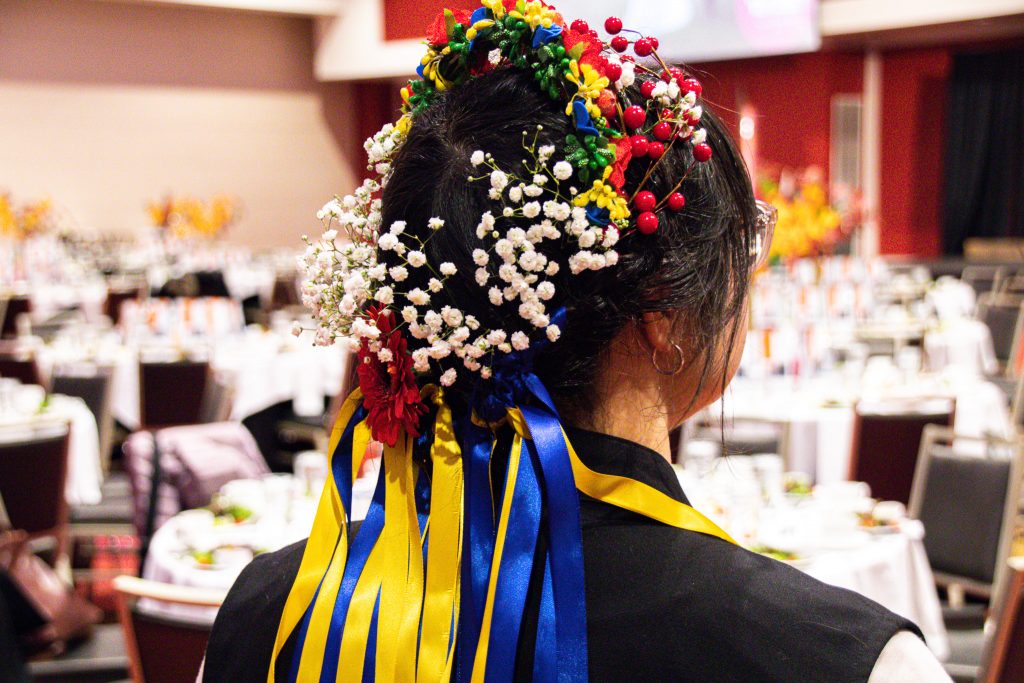
It’s The Right thing To Do
If each one of us reflects on our own stories, we can see God clearly leading and moving in our lives. As I reflect on my own story, I see that I started out focused solely on myself. But then I met the Holy Spirit, and God became real to me. I made a firm decision to follow Him with my life. Then during my college years, I went on a mission trip with Global Outreaches Unlimited because I thought it would be fun. Well, it was fun, but it also changed the direction of my life. My heart for other cultures grew. When my graduate degree in Intercultural Studies required me to do an internship and my top choice fell through, I was placed with World Relief.
As the humanitarian arm of the National Association of Evangelicals, World Relief is an international Christian nonprofit organization with a mission to “empower the local church to serve the most vulnerable.” In the United States we work primarily with refugee resettlement and immigration services. I was amazed that there was an organization that loved two things I loved: the Church and the immigrant. I spent a year learning about World Relief’s ministry to refugees, much of it from refugees themselves. After my internship, I was hired in Spokane, Washington, as a refugee resettlement case manager where I’ve served for the past ten years.
Now that you’ve heard my story, let me tell you a story of one of my refugee friends. Shortly after he was born, his family fled to a neighboring country to escape state-sanctioned infanticide. Though they were told to leave by someone they trusted, they also fled out of fear that their son would be killed. You know this refugee too. His name is Jesus.
When refugees hear Jesus’ story, that He was also persecuted and made to flee to a different country much as they were, they feel known. They realize He understands what they are going through. He has experienced what they are experiencing.
For years a church here in Spokane has hosted a “First Christmas” event for newly arrived refugees. The church throws a party with food and toys for the kids and also shares Jesus’ story. It’s cool to hear about the moments when these newcomers realize that Jesus understands them because He was one of them.
“It’s cool to hear about the moments when these newcomers realize that Jesus understands them because He was one of them.”
Jordan bemis
Each of these refugees has a story to tell. Every story is different, yet every story is similar. The struggles they face are not just the fear and the fleeing; the struggle is also with identity. I have heard over and over again that a refugee doesn’t know who they are. People in their native country didn’t want them and in fact may have tried to kill them. Neither did they have rights in neighboring countries to which they fled. They were not allowed to work, and in many cases, kids were not able to attend school. They were forced to simply wait.
Refugees will tell you that this waiting until someone wanted them was the hardest part of their journey. I know many who had to wait ten, fifteen, even twenty years. I know adults in their twenties who were born in refugee camps; it is the only life they have known.
The average wait for a refugee is seven years. That is a long time to not know how you fit in the world. Can you imagine how hard that wait would be on you mentally, emotionally, and physically?
GOD IS DRAWING THE NATIONS
One of our family’s favorite verses is Isaiah 55:5 (NIV):
Surely you will summon nations you know not, and nations you do not know will come running to you, because of the Lord your God, the Holy One of Israel, for he has endowed you with splendor.
It is God who moves people. It is God who has allowed these refugees to come here. In the process He is drawing them and us to Him. Today there are 27.1 million refugees in the world registered with UNHCR (United Nations High Commissioner for Refugees). On average, only half of one percent of those are resettled to a new country each year. Since I started working at World Relief Spokane in 2012, our office has received 2,401 refugees. That’s a lot of midnight airport pick-ups, home visits, grocery shopping, and enrolling kids in school! But those are just the tasks I am required to do because they are part of my job. It is their stories and the relationships that have impacted our community and me the most.
When I began, one of my first cases was a mom from Afghanistan with four young boys. I spent a lot of time at their apartment because the landlord kept calling me with complaints such as the boys running around breaking off sprinkler heads and making messes in the laundry room. I’d drive to their place, spend time with them, and wonder how they were going to be okay. It was hard for them, but through relationships they built with us and with the community, they got settled and were able to grow and learn.
“The average wait for a refugee is seven years. That is a long time to not know how you fit in the world. Can you imagine how hard that wait would be on you mentally, emotionally, and physically?“
jordan bemis
After five years, I was privileged to see them become citizens of the United States. Now ten years later, those boys are succeeding in college, graduating, and beginning successful careers. One of the boys even joined our staff for a while. Just how far they’ve come since they first arrived to where they are now shows God’s hand on their lives.
There are many misconceptions about refugees, but actual statistics prove that, as in the case of the Afghan family, most eventually benefit their new communities. After the initial investment where we help them find housing and their first jobs, connect them to English classes and volunteers, and help them access healthcare they end up contributing in many ways. They start businesses that employ local people at a faster rate than native born Americans, they help stimulate the economy, and they are willing to do hard, physically demanding work that native citizens might not want to do. Those are just some of the financial benefits. Refugees add value to their new communities in so many other ways as well.
I was recently speaking to a high school group about the subject of refugees, sharing stats about how refugees add value to the United States. I shared that within twenty years of settling here, the amount refugees pay in taxes more than makes up for what it cost the United States to resettle them. I was trying desperately to make a case about why we should help refugees when a girl in the front raised her hand. She said, “Well, all of that doesn’t really matter, does it, because isn’t it just the right thing to do?”
I was speechless, hearing someone so young express truth a whole lot better than I was. Helping refugees is the right thing to do. Micah 6:8 says, “And what does the Lord require of you? To act justly and to love mercy and to walk humbly with your God.” We should minister and partner with the refugee because it is God who is at work in both them and us, and He is wanting us to partner with Him in His mission. It is God who is drawing refugees and us to Him.
It’s the incarnation of Jesus we hear about in the Christmas story that allows everyone, especially refugees, to relate to and know Him. And it is Christ in us through the Holy Spirit who gives us the courage to cross cultures, languages, and religions and to build relationships with refugees. This is a reciprocal relationship, where both the Church and refugees mutually learn from each other. We are blessed by one another as we are both drawn to Jesus.
So how can you make a difference in the life of a refugee?
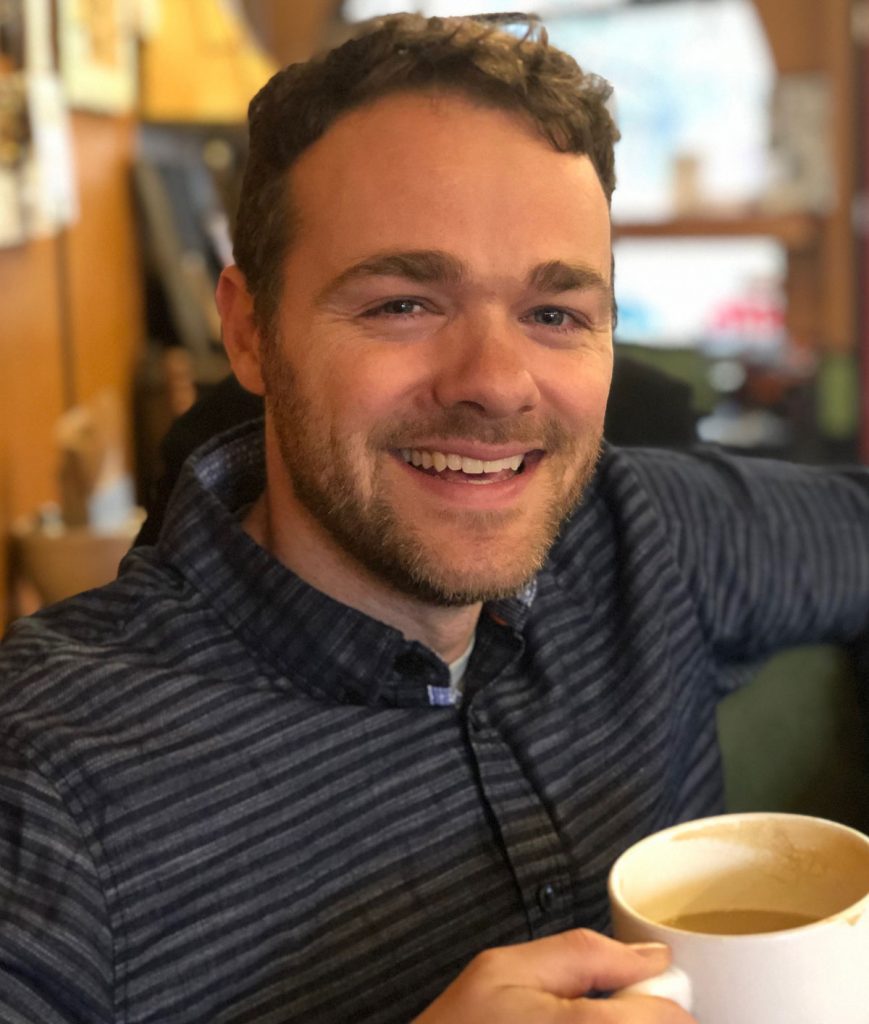
Jordan Bemis is the Resettlement Director at World Relief, where he has worked for ten years. He and his wife, Hannah, have three kids, Asher, Nora, and Abel, and serve at Turning Point Open Bible Church in Spokane, Washington. The family recently adopted a puppy named Maverick.
Please Note: This article was originally published in the Message of the Open Bible.
Leaving Ukraine: The Ochkur Family
The Ochkur Family – Slava, Iryna and three-year-old Olivia – had been working on their immigration to the United States from Ukraine for four years. Slava needed one last stamp on his documents, and then the airline tickets could be issued. They expected to get the call any day. Instead, on February 24, 2022, they woke up in Kyiv to discover that Russia had invaded Ukraine from Belarus just to the north of their home. Slava decided they needed to leave immediately. They packed their car, leaving much behind, and headed for Slava’s parents’ house which was closer to the Polish border and somewhat removed from the fighting.
Slava and Iryna had been working with the US Embassy in Kyiv through the Lautenberg Program, which allows members of religious minorities who are living in countries associated with the former Soviet Union to join their families already in the United States. However, when the unrest began, staff from the US Embassy were evacuated from Ukraine. No one was left to help them with their tickets.
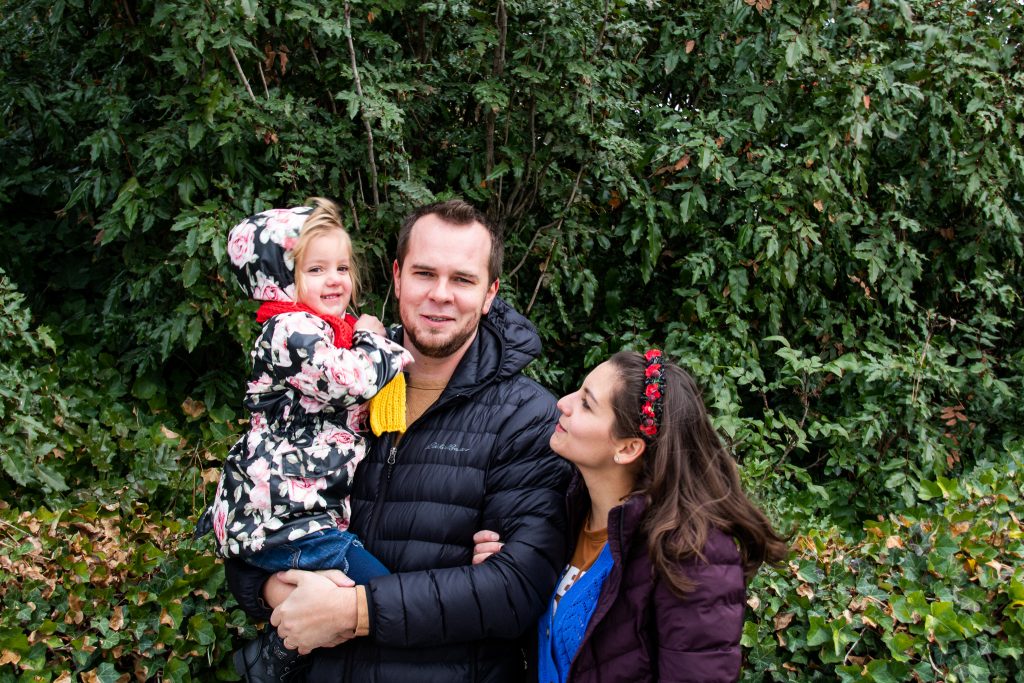
“We stayed at his parents’ and just wait,” Iryna said. “We don’t know how long we need to wait. When we called, they just said, wait until the war is finished or just try to cross the border to another country, and we will try to help you. So we decide to try to move to another country.”
They spent about two weeks living with Slava’s parents in Western Ukraine. “It was a really hard two weeks.”
Slava added: “It was the beginning of the war. Nobody knew what to expect. If Kyiv will be taken or not. If government will still be there or not. And, also, Russia started to bomb, not just Kyiv, but all around Ukraine and even closer to where they were staying.”
Slava’s parents were in the same situation as Slava and Iryna. They were also in the process of immigrating to the US and waiting for tickets. They all knew they needed to cross the border and get to a place of safety.
However, Slava’s missing stamp created a problem. Everyone was able to cross the border except him. Iryna, Olivia and Slava’s parents had to cross into Poland without him, uncertain whether or not he would be able to rejoin them. (When the war began, all men from the ages of 18 to 60 were summoned to join the war effort. Slava had an exception because he was already slated to move to the US, but in war, things do not always go as they should.)
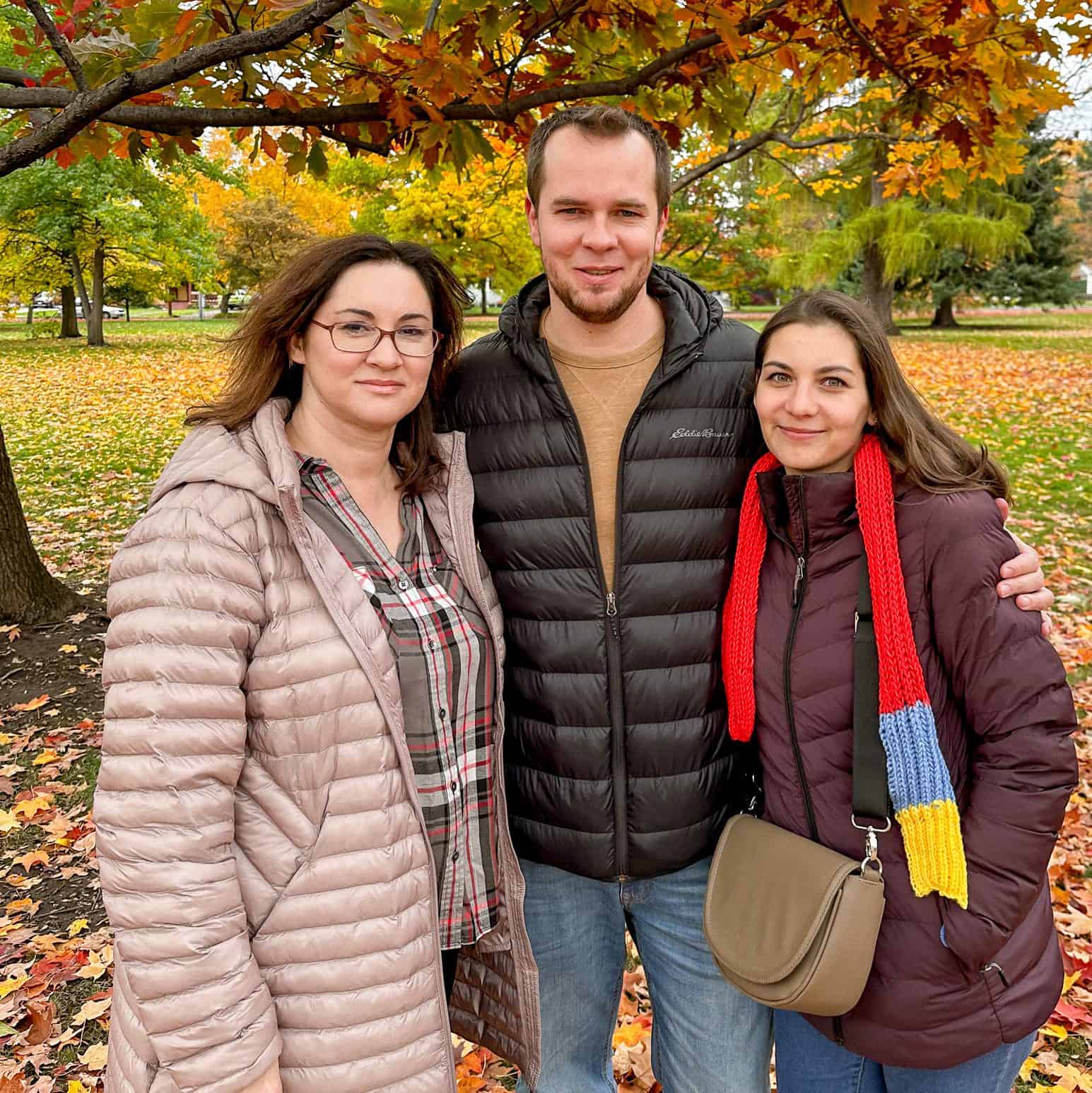
Olga Symonenko was helping to translate during this interview. She also played an important role in the Ochkur’s story. Olga is the mother of World Relief Spokane employee Erika Symonenko, our housing coordinator. Olga had escaped a war in Tajikistan when she was 18 and then in 2008, she had to run again, resettling with her family in Spokane through World Relief. When the war broke out in Ukraine, she and her sister, Katya, who lives in Germany, began to plot how they could help friends and family seeking to flee Ukraine. Olga helped numerous families, including the Ochkurs, get to her sister’s in Germany.
When Olga called about the Ochkurs, Katya and her husband were already headed to Poland to pick up another family. Even though the two families had never met, Katya and Andreas agreed to pick them up, as well. Andreas ended up sleeping in his car at the border for three days, waiting for their arrival, and their church provided a place for the Ochkurs to stay while they waited for word about their immigration to the US, as well as warm clothes since they were not able to pack any.
The great news is that Slava was able to join his parents, Iryna and Olivia after 20 days, but, Iryna explained, that was a hard 20 days. “We can’t move without him to the USA. We must move together.” And they did not know when their tickets and authorization to move would come through.
In the end, the Ochkur Family stayed in Germany for four and a half months. They arrived in Spokane in July, where they were welcomed by Slava’s brother and family. World Relief helped them to find an apartment, and now they are studying English. They have their Social Security numbers and are waiting for work authorization.
Slava said they are doing well. “I am very glad that we are here together, that we can live together. I think it’s really good that we can study right now, very important for us to study right now and be together.”
However, Iryna is concerned about her parents who are still back in Ukraine: “They are still in Kyiv. They were in Kyiv all this time. They have electricity problem. They do not always have lights. We are not sure if they will have heat. The heating system also experiences lots of problems.” She speaks to them by phone, but sometimes the connection is not good.
“My parents, my family, they are in constant danger.” Iryna broke down in tears. Slava explained, “She is very worried about her parents… The last eight months show us that the things we were hoping for, or things we usually hoping for, they may not work, and so, we must rely on God and his providence.”
The Ochkur Family’s story reflects the pain of so many refugees. Even when they reach safety, their hearts are still breaking for the loved ones they left behind.
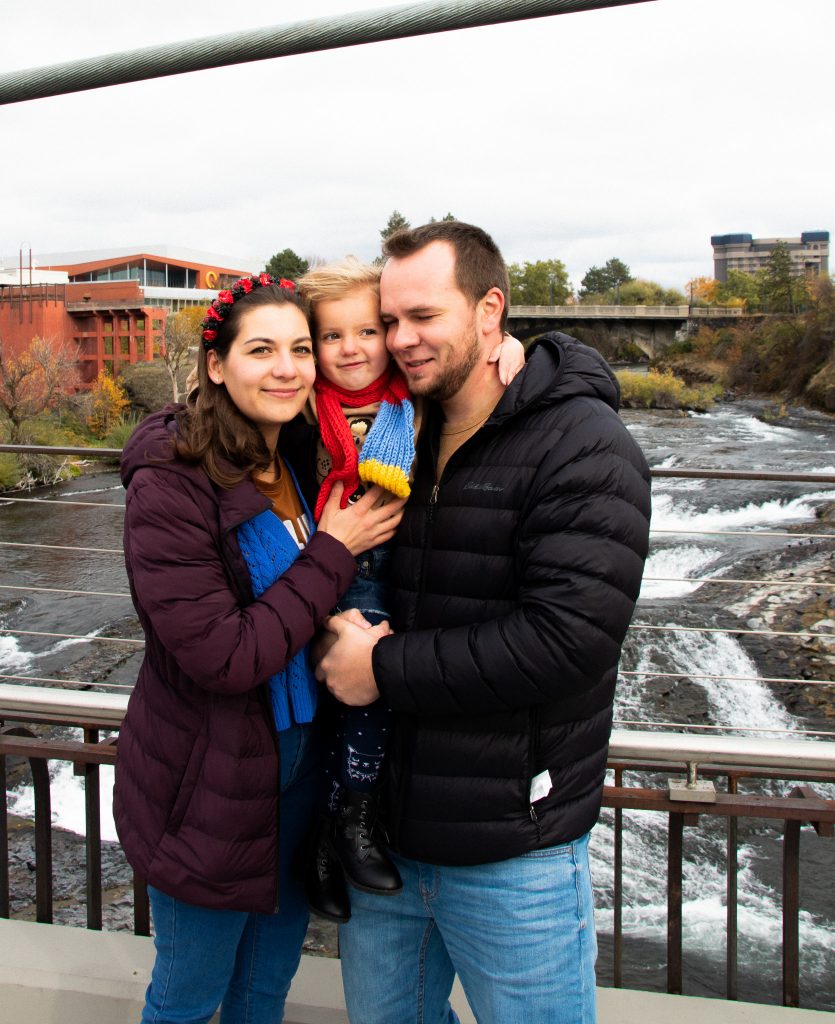
“Your life and my life flow into each other as wave flows into wave, and unless there is peace and joy and freedom for you, there can be no real peace or joy or freedom for me.”
– Frederick Buechner











